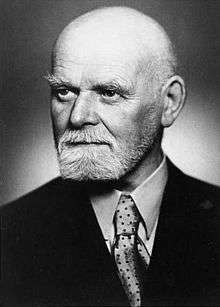Theodor Körner (Austrian president)
| Theodor Körner | |
|---|---|
 | |
| 5th President of Austria | |
|
In office June 21, 1951 – January 4, 1957 | |
| Chancellor |
Leopold Figl Julius Raab |
| Preceded by | Karl Renner |
| Succeeded by | Adolf Schärf |
| 2nd Mayor and State Governor of Vienna (Second Republic) | |
|
In office April 17, 1945 – June 18, 1951 | |
| Preceded by | Rudolf Prikryl |
| Succeeded by | Franz Jonas |
| Personal details | |
| Born |
April 23, 1873 Újszőny by Komorn, Austria-Hungary now Komárom, Hungary |
| Died |
January 4, 1957 (aged 83) Vienna, Austria |
| Nationality | Austrian |
| Political party | Social Democratic Party of Austria |
| Spouse(s) | unmarried |
| Religion | Roman Catholicism |
| Awards |
- Austro-Hungarian Military Merit CrossThird Class |
| Military service | |
| Service/branch |
|
| Rank | Major - Colonel - General |
| Unit |
- 72nd Infantry Brigade at Zagreb |
| Commands |
- XV and VII Imperial Army Chief of Staff (1915 and 1916 respectively) |
| Battles/wars | World War I |
Theodor Körner, Edler von Siegringen (German pronunciation: [ˈteːoˌdoːɐ̯ ˈkœʁnɐ]; April 23, 1873 – January 4, 1957) served as the fifth President of Austria, between 1951 and 1957.
Life
As son of an officer of the Austro-Hungarian Army, he was born in Újszőny,[1] (today Komárom, Hungary). Family legend has it that he was related to the poet of the same name, but these stories are not proven.
Körner attended the military school in Mährisch Weißkirchen (Hranice), the military academy, and became lieutenant in 1894. He served as an officer in Agram (today Zagreb, Croatia) and was promoted to major in 1904, in which year he became a member of the Austrian staff. During World War I, he was an active commander on the Italian front. He resigned from his military career in 1924 as a General.
Always interested in politics, he joined the social democrats and became a member of parliament in 1924. He served as Chairman of the Federal Council of Austria between December 1933 and February 1934.
The civil war in Austria and the installation of the austro-fascist dictatorship under Engelbert Dollfuss ended Körner's career as a politician. He was arrested, like other members of his party, by the authoritarian government that banned all opposition parties and put their representatives into prison. During World War II, Körner was again imprisoned, this time by the Nazis.
After the war, in April 1945, Körner became Mayor of Vienna in the newly erected Second Republic. Körner was responsible for rebuilding and reconstructing Vienna, which was heavily destroyed due to the bombing during the war. After the death of Karl Renner, his party nominated Körner as candidate for the presidency, and Körner won the elections with slightly more than 51 percent of the votes. He therefore became the first President of Austria directly elected by the people. Körner died in Vienna, in office, the second consecutive President to do so.
Körner had a profound knowledge of military sciences and wrote about military theory. In Vienna, there is a street named after him, as is the Theodor Körner Prize, an Austrian award for science and art.
Awards
- Honorary Doctorate at the Vienna University of Technology (1945)
- Honorary citizen of Vienna city (1948)
- Grand Cross special class of the Order of Merit of the Federal Republic of Germany (1956)

References
- ↑ Österreichisches Staatsarchiv / Kriegsarchiv
Sources
- Ilona Duczynska (Hrsg. und kommentiert): Theodor Körner. Auf Vorposten. Ausgewählte Schriften 1928 - 1938. Europaverlag, Wien 1977, ISBN 3-203-50617-3
- Thea Leitner: Körner aus der Nähe. Danubia Verlag, Wien 1951.
- Gustav K. Bienek: Ein Leben für Österreich. Verlag für Jugend und Volk / Verlag Jungbrunnen 1953.
- Eric C. Kollman: Militär und Politik.. VERL.DF.GESCH.U.POL., Wien 1973.
- Thea Leitner: Hühnerstall und Nobelball. 1938–1955. Leben in Krieg und Frieden. Ueberreuter, Wien 2004, ISBN 3-8000-3927-3
External links
- Biography, contact details and speeches since 1996 of Theodor Körner at the Parliament of Austria (German) Theodor Körner
- Theodor Körner in the German National Library catalogue
- Originalton von Bürgermeister Körner (1951)
- Biographie in der Wiener Zeitung
- "Theodor Körner". Aeiou Encyclopedia (in German).